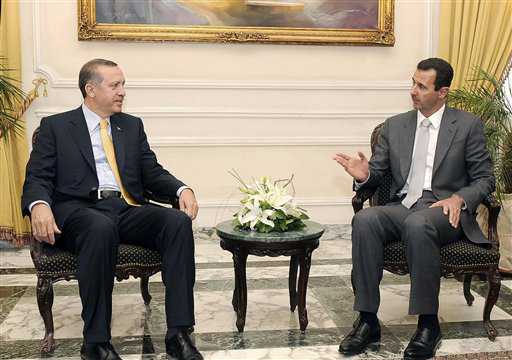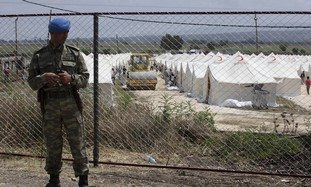By Justin Vela
The Daily Star
ISTANBUL: Normally, Issa does not like big cities such as Istanbul. But conditions are anything but normal in his native Syria, where Bashar Assad’s forces continue a brutal nine-month crackdown on opposition that has left over 4,000 people dead, according to the latest United Nations estimates.
Issa – who did not wish to give his full name for fear of reprisals against himself or his family – arrived in Istanbul in August having fled Syria after attending three opposition demonstrations in Damascus and transporting an injured protester to safety after he was hit by a tear gas canister.
Issa, who had previously worked as an Arabic teacher for foreigners in Damascus said there was no longer any work in Syria with the exodus of foreign language students.
After searching for employment in Turkey’s vast unofficial economy, he eventually began to build up a pool of students to teach Arabic and rented a room in Istanbul.
“There are many, many Syrians here, moving around [in Istanbul], he said. “Some leave because they can’t find jobs here, and don’t speak Turkish,” Issa added.
For Syrians such as Issa, Istanbul is merely an escape.
For others, the city has become a staging ground to shape Syria’s future with various Syrian opposition groups using the city as a base to coordinate activities inside Syria.
Most Syrians contacted for this article declined interview requests, citing security concerns.
Many were in Istanbul without government permission and did want their activities described.
But three Syrian men described their frustration following the news of violence in Syria and concern for their families there.
“We don’t really feel like we are outside because all our families are inside [Syria],” said Bekes-who had lived in Istanbul for six years.
Yilmaz Saeed, one of the few Kurdish members of the Syrian National Council, an umbrella civilian opposition organization based in Paris, said he is concerned about the lack of discussion over the future of minorities in a post-Assad Syria.
“The future of Syria does not guarantee the [rights of] minorities,” he said, describing how he was trying to advance the Kurdish voice in the SNC.
“We could come back to the same point, it could be the same.”
Another Kurd, a businessman named Bahzad, added that while Syrians were “everywhere” in Istanbul, Syrian Kurds faced more difficulties than Arabs.
“The Turkish government really has a problem with Kurds,” according to Bahzad.
Only Saeed said he planned to return. “Most of Syria is still quiet. When is Damascus and Aleppo going to join?” he asked.
“The Kurds joined on the first day, the Kurds actually started protesting in 2004. The Syrian revolution started in 2004. The others did not join [then], it was only the Kurds.”
The influx has some worried that the unrest next door is spilling over the border.
“Damascus is already in Istanbul,” wrote Kerim Balci, a columnist at the Turkey’s daily Today’s Zaman, following a Nov. 30 shooting inside the Topkapi Palace – a popular Istanbul tourist destination – by a Libyan gunman allegedly driving a car with Syrian license plates on the same day that Ankara announced that was slapping sanctions on Damascus.
“Turkey is in the Middle East … The artificiality of the political borders in this region holds, not only for the political authorities, but also for social and economic problems. A prolonged social unrest in Syria will certainly have repercussions for Turkey,” Balci added.
While he felt generally accepted by the Turks, Issa claimed that most had little understanding of the events taking place in Syria.
“The Turks do not seem to have a very good idea what’s going on,” he said. “They are always just asking about [Turkish Prime Minister Recep Tayyip] Erdogan. They give me the thumbs and say, ‘Erdogan or Assad?’”
Still, Istanbul is a fresh start for him. He has begun sending some money back to his family who does not support the regime, but are too scared to join demonstrations. They stay inside their house, he said.
His father no longer has work and their savings are running out.
But now he faces a new challenge: His passport will soon expire and other Syrians have warned him against going to the Syrian Consulate to have it renewed.
“They will keep an eye on me [if I go there],” he said. “What I am doing … and if I am against the regime, they will do something against my family. That’s not just in Istanbul, it’s all of Europe.”
A version of this article appeared in the print edition of The Daily Star on December 08, 2011, on page 8.
via THE DAILY STAR :: News :: Middle East :: Syrians in Turkey eye uncertain future.





